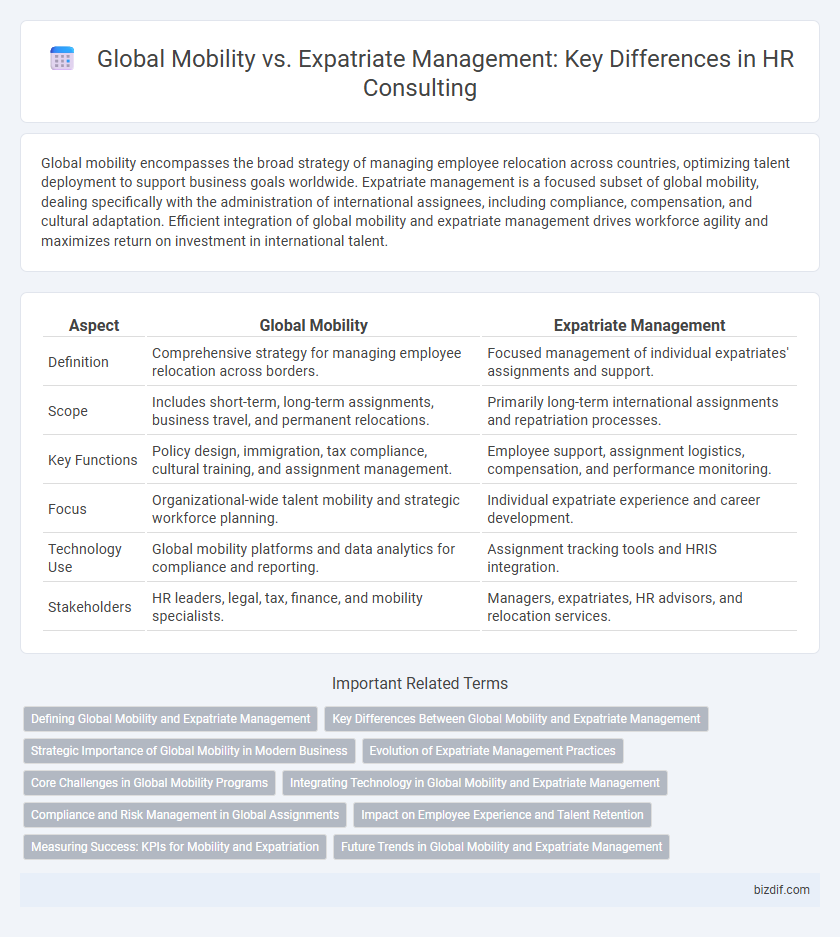Global mobility encompasses the broad strategy of managing employee relocation across countries, optimizing talent deployment to support business goals worldwide. Expatriate management is a focused subset of global mobility, dealing specifically with the administration of international assignees, including compliance, compensation, and cultural adaptation. Efficient integration of global mobility and expatriate management drives workforce agility and maximizes return on investment in international talent.
Table of Comparison
| Aspect | Global Mobility | Expatriate Management |
|---|---|---|
| Definition | Comprehensive strategy for managing employee relocation across borders. | Focused management of individual expatriates' assignments and support. |
| Scope | Includes short-term, long-term assignments, business travel, and permanent relocations. | Primarily long-term international assignments and repatriation processes. |
| Key Functions | Policy design, immigration, tax compliance, cultural training, and assignment management. | Employee support, assignment logistics, compensation, and performance monitoring. |
| Focus | Organizational-wide talent mobility and strategic workforce planning. | Individual expatriate experience and career development. |
| Technology Use | Global mobility platforms and data analytics for compliance and reporting. | Assignment tracking tools and HRIS integration. |
| Stakeholders | HR leaders, legal, tax, finance, and mobility specialists. | Managers, expatriates, HR advisors, and relocation services. |
Defining Global Mobility and Expatriate Management
Global mobility encompasses the strategic movement and management of employees across international borders to optimize workforce capabilities and business goals. Expatriate management specifically addresses the administration, support, and integration of employees assigned to work abroad for extended periods. Both disciplines are critical in HR consulting for ensuring compliance, employee well-being, and seamless cross-cultural transitions.
Key Differences Between Global Mobility and Expatriate Management
Global mobility encompasses a broad strategy for relocating employees internationally, including short-term assignments, international business trips, and long-term relocations, while expatriate management specifically focuses on supporting employees placed abroad for extended periods. Key differences include global mobility's emphasis on flexibility and diverse talent deployment across various countries, whereas expatriate management addresses in-depth employee relocation support, compensation, tax compliance, and cultural integration for long-term assignments. Effective global mobility programs optimize workforce agility on a global scale, while expatriate management ensures detailed oversight of individual expatriates' experiences and legal requirements.
Strategic Importance of Global Mobility in Modern Business
Global mobility enables organizations to deploy talent efficiently across borders, enhancing agility and competitive advantage in today's global economy. Strategic management of global mobility ensures compliance with international regulations while optimizing workforce skills and cultural integration. Effective expatriate management remains a critical component, but global mobility expands this scope by encompassing short-term assignments, remote work, and international talent exchanges to meet dynamic business needs.
Evolution of Expatriate Management Practices
Expatriate management practices have evolved significantly, shifting from traditional long-term assignments to more flexible, short-term and virtual mobility solutions. Global mobility now integrates advanced data analytics and technology to enhance employee experience, cost efficiency, and compliance across borders. Organizations increasingly prioritize cultural adaptability, local compliance, and career development in managing expatriates within dynamic global workforces.
Core Challenges in Global Mobility Programs
Core challenges in global mobility programs include navigating complex immigration regulations, managing tax compliance across multiple jurisdictions, and ensuring seamless cultural integration for assignees. Effective risk management and cost control are critical to minimizing disruptions and maintaining program efficiency. Addressing these issues requires tailored policies and technology-driven solutions to support diverse workforce mobility needs.
Integrating Technology in Global Mobility and Expatriate Management
Integrating technology in global mobility and expatriate management streamlines assignment tracking, compliance, and cost control through centralized digital platforms and AI-driven analytics. Advanced mobility software enhances real-time data access, automates payroll, tax regulations, and visa processes, improving accuracy and reducing administrative burdens. Leveraging cloud-based solutions facilitates seamless communication and collaboration among HR teams, assignees, and external vendors, optimizing global talent deployment and employee experience.
Compliance and Risk Management in Global Assignments
Global mobility and expatriate management both require stringent compliance and risk management to navigate complex international labor laws and tax regulations effectively. Ensuring adherence to visa requirements, local employment standards, and data protection laws mitigates legal risks and safeguards company reputation during global assignments. Robust risk assessment frameworks and continuous monitoring of regulatory changes are essential for managing expatriate assignments with maximum compliance and minimal exposure.
Impact on Employee Experience and Talent Retention
Global mobility programs enhance employee experience by offering diverse cultural exposure and career growth opportunities, which significantly improve talent retention rates. Expatriate management focuses on personalized support and seamless relocation processes, reducing adjustment challenges and boosting employee satisfaction. Effective integration of both strategies strengthens workforce agility and loyalty in multinational organizations.
Measuring Success: KPIs for Mobility and Expatriation
Measuring success in global mobility and expatriate management relies on KPIs such as assignment completion rates, cost per assignment, and employee engagement scores. Tracking repatriation success, including retention rates post-assignment and time to productivity, provides insights into the effectiveness of mobility programs. Utilizing data analytics to benchmark against industry standards enhances strategic decision-making in global HR consulting.
Future Trends in Global Mobility and Expatriate Management
Future trends in global mobility emphasize digital transformation, with AI-powered platforms streamlining assignment management and enhancing real-time data analytics. The rise of remote work and hybrid models reshapes expatriate management by promoting flexible assignment durations and location-independent roles. Companies increasingly prioritize employee experience and diversity, equity, and inclusion (DEI) in global mobility strategies to attract and retain top talent worldwide.
Global mobility vs expatriate management Infographic

 bizdif.com
bizdif.com